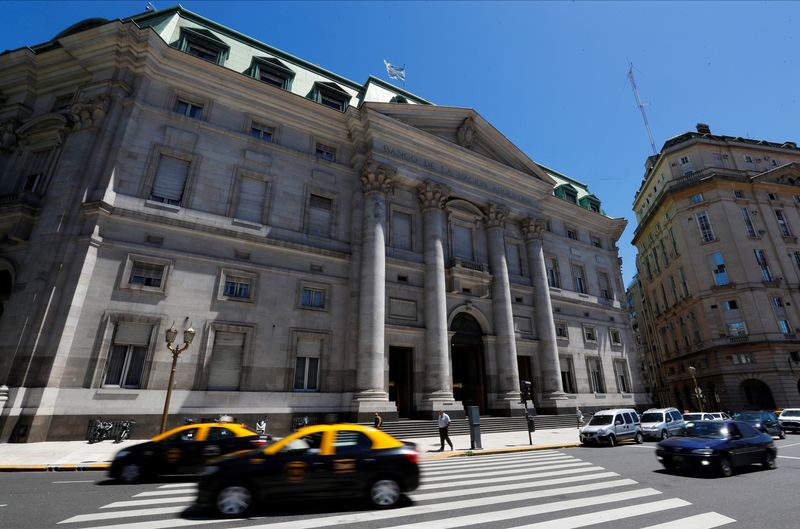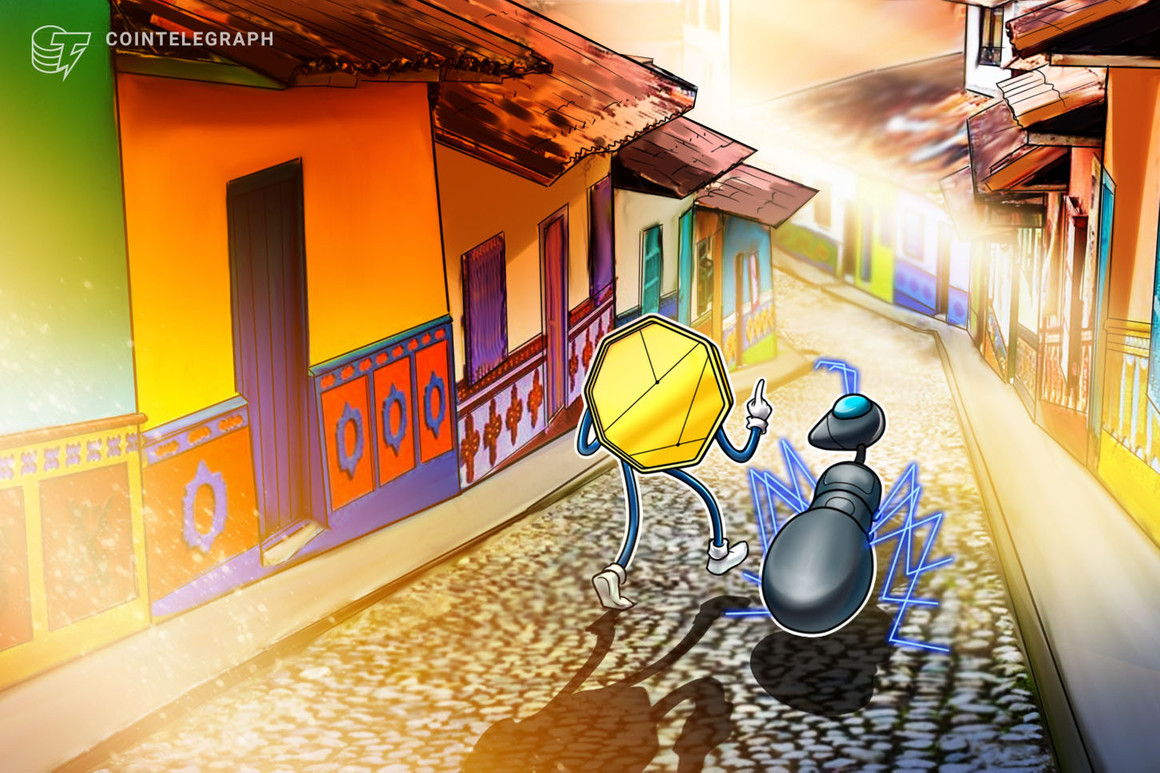 Two individuals, a woman and a man, were captured in Argentina on charges of having perpetuated a Ponzi scheme that moved over $400 million in cryptocurrency in Brazil. The operation managed to track the couple’s whereabouts with the help of the Argentine Federal Police and Interpol. Argentina Captures Couple Accused of Orchestrating a $400 Million […]
Two individuals, a woman and a man, were captured in Argentina on charges of having perpetuated a Ponzi scheme that moved over $400 million in cryptocurrency in Brazil. The operation managed to track the couple’s whereabouts with the help of the Argentine Federal Police and Interpol. Argentina Captures Couple Accused of Orchestrating a $400 Million […]
Source link
Argentina
A general view of the pools for the process of salt extraction at Salinas Grandes on March 28, 2023 in Jujuy, Argentina.
Ricardo Ceppi | Getty Images News | Getty Images
Momentum behind Argentina’s lithium mining boom is picking up fast.
The country is thought to be on track to match — and potentially even surpass — neighboring Chile as Latin America’s leading lithium producer by 2030, with investors and operators from across the globe scrambling to get involved in its burgeoning ventures.
Lithium, sometimes referred to as “white gold” due to its light color and high market value, is regarded as a critical component of the energy transition. The lightest metal in the world, lithium is commonly used in electric vehicles, cellphones and rechargeable batteries for laptops.
Analysts at political risk consultancy Eurasia Group say the trajectory of Argentina’s lithium production hinges on the upcoming presidential election and how the outcome affects the country’s macroeconomic outlook, as well as the likelihood of interventionist policies.
“The stakes are high,” analysts at Eurasia Group said in a research note published Sept. 18. “At risk is not only Argentina’s opportunity to develop a robust lithium — and possibly battery — supply chain, but also the progress of the global energy transition.”
“If Argentina’s lithium boom is stifled, it will hinder supplies needed to feed the electric vehicle (EV) revolution, especially later this decade when supply-and-demand fundamentals for lithium are expected to tighten,” they added.
Latin America currently supplies about 35% of the world’s lithium, according to the International Energy Agency, with Chile (26%) and Argentina (6%) leading the way. The region is estimated to hold more than half of global lithium reserves, mainly located in Argentina (21%) and Chile (11%).
An Indigenous protester holds a flag of Argentina during a demonstration against the constitutional reform promoted by Governor of Jujuy Gerardo Morales outside the Justice Palace on August 2, 2023, in Buenos Aires, Argentina.
Ricardo Ceppi | Getty Images News | Getty Images
At present, Argentina has two lithium extraction projects, one in the northern province of Catamarca and another in neighboring Salta. Both operations are predicted to double production in 2024 and an additional 10 projects are currently under construction.
The growing momentum behind the country’s mining boom means that analysts at Eurasia Group expect Argentina’s lithium production to grow fivefold next year and approximately tenfold by 2027.
We’re seeing investors and operators from all walks of life coming into the country; Russian, Canadian, Chinese, American, you name it, that’s happening — which is very interesting.
Mariano Machado
Principal analyst for the Americas at Verisk Maplecroft
Eurasia Group said one “underlying force” that may ultimately hamper Argentina’s emerging lithium industry would be a plunge in global demand and prices below analyst expectations. They note, however, that this prospect appeared increasingly unlikely. “Argentina’s opportunity is now its own to embrace or lose,” they added.
Prices of lithium carbonate in China traded at roughly 166,500 yuan ($23,124) ahead of the country’s annual “Golden Week” holiday, reflecting a fall of nearly 70% when compared to the same period last year.
Looking ahead, however, demand for lithium is expected to be supercharged by the rising deployment of clean energy technologies and some analysts believe prices could spike to record highs as the world begins to face a shortage.
“Argentina has infinite untapped resources when it comes to mining. We’re talking about a new Chile if not more — with the key ingredient being time,” Mariano Machado, principal analyst for the Americas at Verisk Maplecroft, a global risk intelligence firm, told CNBC.
“When it comes to lithium [in Argentina], you cannot skip but you can fast forward that process, so it really reduces that exposure,” he added. “We’re seeing investors and operators from all walks of life coming into the country; Russian, Canadian, Chinese, American, you name it, that’s happening — which is very interesting.”
Argentina vs. Chile
Chile is the world’s second-largest lithium producer after Australia, and a refiner of the essential battery metal.
Leftist President Gabriel Boric announced in April that the state was taking a majority stake in the country’s lithium industry, dismaying some business leaders.
The move was interpreted as a quasi-nationalization of Chile’s industry, with private companies now needing to partner with the government in order to exploit the country’s lithium resources.
Presidential candidate for La Libertad Avanza Javier Milei looks on during a presidential debate on October 01, 2023 in Santiago del Estero, Argentina. Argentinians will head to polls on October 22.
Tomas Cuesta | Getty Images News | Getty Images
“Everyone thinks in Latin America, when it comes to mining and lithium, Chile comes to mind. The thing is, in particular within the mining landscape in Chile, lithium becomes kind of like a dark spot because of the state’s desire to interject in the industry,” Verisk Maplecroft’s Machado said.
“Whereas in Argentina, think about it as kind of like a yin and yang situation. Overall, an obscure situation but when it comes to lithium, it is a very bright spot,” he continued.
“It is a very dynamic situation right now. So dynamic that what we’re anticipating is if the ramp-up gets really serious, we will start seeing hosting communities saying, ‘Hey, we want to be in. I want you to change this place, to transform it. I want to be part of the energy transition but in an active way,'” Machado said.
“Argentina has already become and will become kind of like a hotspot in terms of lithium and all of that brings about good and bad news.”
Demonstrators arrived in Buenos Aires in early August to protest in defense of their territories and natural resources.
Ricardo Ceppi | Getty Images News | Getty Images
Argentina’s northern provinces have a history of extractive activities — and opposition to them from the local community.
Analysts have warned that the lithium industry’s domestic expansion could trigger protests over water access, environmental concerns, and indigenous disputes.
Indeed, in early August, indigenous protesters from the northern Jujuy province arrived in Argentina’s capital of Buenos Aires after a week-long caravan in defense of their territories and natural resources.
The protests took place shortly after a controversial change in legislation gave lithium mining companies greater access to indigenous lands.
What about China?
China is expected to play a pivotal role in developing Argentina’s lithium sector in the near term, with Western producers likely gaining market share in the longer term.
However, an upcoming presidential election may threaten Beijing’s role as a prominent trading partner and major creditor of infrastructure projects.
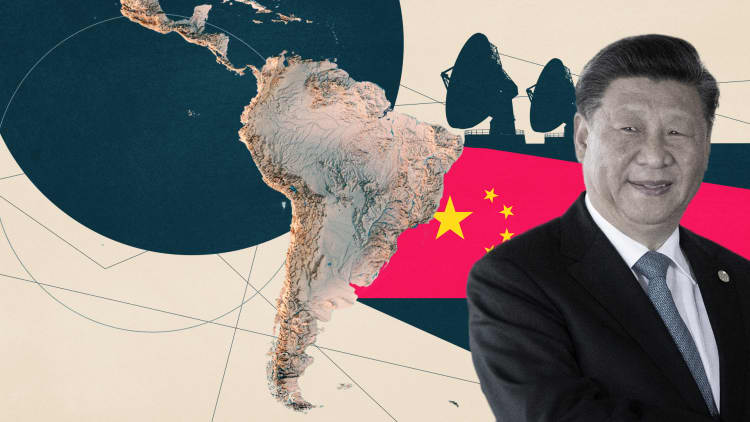
General elections in Argentina are scheduled to take place on Oct. 22 following a shock victory for far-right libertarian economist Javier Milei in August’s presidential primary.
Milei, who received 30.5% of the vote on Aug. 13, has pledged that the country will no longer work with “communist” regimes if he wins the election.
Analysts say Milei’s unpredictable nature and lack of a political track record make it difficult to understand how he will oversee the lithium industry if he comes to power.
Bitcoin blasts past its 2021 all-time high in Argentina, but hyperinflation outpaces gains
Argentina has grappled with hyperinflation for several decades due to failed policies that have led to budget deficits. As time marches on, the likelihood of Argentina — home to 47 million people — facing a full-scale currency collapse looms. But what are the prospects for increased adoption of Bitcoin (BTC), given its outstanding track record when priced in the local Argentine peso currency?
Throughout its history, the Argentine government has frequently resorted to inflating the money supply through bank deposits or government bonds. Notably, Argentina’s aggregate money supply M1 — comprising currency, demand deposits and other checkable deposits — has surged from 2.81 trillion pesos in July 2019 to a staggering 10.66 trillion pesos, marking a 277% increase over three years.
What happened to Bitcoin’s price in Argentine pesos?
Bitcoin’s price on domestic exchanges has soared to 19.6 million Argentine pesos, up from 14.2 million when BTC reached its all-time high in United States dollars in November 2021. This means that despite a 61.5% drop from $69,000, investors in Argentina have still managed to accrue gains of 38% when measured in the local currency.

However, one may encounter a different result when consulting Google or CoinMarketCap for Bitcoin’s price in pesos. The answer to this discrepancy lies in the official currency rate for the Argentine peso, which is more intricate than most investors are accustomed to.
To begin with, there is the official rate, known as the “dollar BNA,“ set by Argentina’s central bank and used for all government transactions, as well as for imports and exports.

Observe how the Bitcoin price in Argentine pesos, as effectively traded on cryptocurrency exchanges, is nearly double Google’s theoretical price.
This theoretical price is calculated by multiplying the BTC price on North American exchanges in U.S. dollars by the official Argentine peso rate provided by the local government. This phenomenon is not unique to cryptocurrencies; it also affects other highly liquid international assets, such as stocks, gold and oil futures.
By artificially strengthening the official rate in favor of the Argentine peso, the government aims to stabilize the economy, reduce capital flight, and curb speculative trading by making it more expensive to purchase foreign currency and store wealth in U.S. dollars. This measure may also increase the cost of imports while boosting exports, with the goal of improving the trade balance.
Related: Bitcoin soars in Argentina as Javier Milei wins presidential primary
However, manipulating the official foreign exchange rate, as seen in Argentina’s case, ultimately contributes to inflation and impedes economic growth. Firstly, it creates incentives for the existence of an unofficial and unregistered market, known as the “dollar blue,” which also fosters illegal activities, undermines financial transparency and discourages foreign investment.
This leads to varying exchange rates, depending on the market in which the transaction occurs and whether or not it involves the government and official banks.
Is Bitcoin a reliable store of value for investors in Argentina?
According to Bitso exchange prices in Argentine pesos, Bitcoin has gained 150% over the two years ending Sept. 21, moving from 7.84 million pesos to 16.6 million pesos. However, the accumulated official inflation rate during this period has exceeded 300%, making it incorrect to claim that Bitcoin has been a dependable store of value.
Notably, those who opted for U.S. dollars, whether in the traditional form or stablecoins, have seen their holdings increase by 297% during the same period, effectively matching the inflation rate. This analysis exclusively compares the two-year period between September 2021 and September 2023.
Nonetheless, the outcome is somewhat disappointing for BTC proponents and is likely to favor the adoption of stablecoins in the region.
On a positive note, investors have had the opportunity to learn about the advantages of self-custody and scarcity, given that the local currency has been decimated by its continuously inflating supply.
In the end, for Argentinians, as long as the U.S. dollar maintains its purchasing power by keeping pace with local inflation, there is little room for Bitcoin to become the preferred store of value.
This article is for general information purposes and is not intended to be and should not be taken as legal or investment advice. The views, thoughts, and opinions expressed here are the author’s alone and do not necessarily reflect or represent the views and opinions of Cointelegraph.
Argentine far-right libertarian economist and presidential candidate Javier Milei celebrates the results of the primary elections with his sister Karina Milei at his headquarters in Buenos Aires on August 13, 2023.
Alejandro Pagni | Afp | Getty Images
Argentina’s central bank devalued its currency, the peso, by close to 18% and hiked its benchmark interest rate by a whopping 21 percentage points to 118% on Monday following a shock primary election win by far-right libertarian Javier Milei.
The moves were a bid by the government to calm markets in the wake of the Argentinian congressman’s surprise victory, which gave him the largest share of votes in the country’s presidential primary election at roughly 30%, far exceeding forecasts.
Markets had been betting on favorable results for moderate candidates. Argentina’s presidential election will be held in October.
Argentinian stocks and its sovereign dollar bonds were also lower Monday.
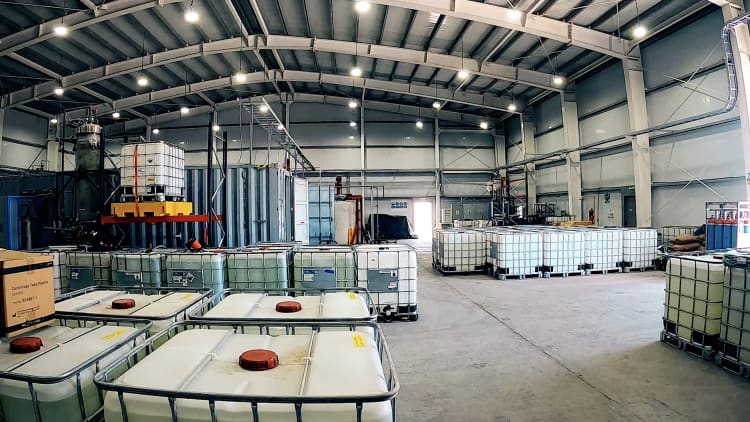
The central bank said Monday that the peso would be held at 350 to the dollar until the October vote.
Milei, riding on a wave of popular discontent, has vowed to get rid of the central bank and dollarize Argentina’s economy. He has also advocated for sharp spending cuts.
Latin America’s third-largest economy, Argentina has been mired in economic and financial crisis for years. The country’s foreign reserves are shrinking fast and its inflation is forecast at 142.4% for the year.
Argentina is on the brink of its sixth recession in a decade. Milei is a vocal critic of what he calls the corrupt political class, saying the country’s leaders have thrown it from one crisis to another. He believes replacing the peso with the dollar could calm inflation, but many economists warn that would trigger financial chaos.
Bitcoin-Friendly Javier Milei Wins Presidential Primaries In Argentina
Argentine libertarian Presidential candidate and Bitcoin enthusiast Javier Milei has shocked the world by emerging victorious in Argentina’s recent primary elections. The pro-Bitcoin advocate scored the majority of the votes, making a stinging win during the Primaries on August 13.
Javier Milei Demolishes Electoral Competition
Javier Milei, an outspoken Argentine economist, is known for his sharp criticism of traditional politics and his fervent support of cryptocurrencies, including Bitcoin. Due to this, previous poll predictions had stated that Milei would score no higher than third place in the recent elections.
However, Milei decimated the August elections with a stunning display of voter support, accumulating over 30% of the 90% of votes counted. Milei leads the libertarian party, “La Libertad Avanza” and the party is dominating with 32% of votes.
In comparison, Argentine presidential candidates like Patricia Bullrich in “Juntos por el Cambio” (Together for Change) party received 28.14% votes, and Sergio Massa in “Unidos por la Patria” (Union for the Homeland) party received 26.84% votes.
From the onset, Milei has attracted the attention of the Argentine population through his outspoken support of cryptocurrency, lack of political interventions, and the abolishment of the country’s central bank.
Milei has stated that the country’s central banks should be destroyed to eliminate corrupt political authorities that influence the country’s economy and inflation rates. He has also said that Argentina’s adoption of bitcoin cryptocurrency would help create a more stable and accountable government, reducing government bureaucracy and improving the country’s declining economy.
“The central bank is a scam, a mechanism by which politicians cheat the good people with inflationary tax,” Milei stated.
BTC price recovers after brief dip | Source: BTCUSD on Tradingview.com
Argentina Grapples with Spiraling Economic Crisis
The daily reality of the Argentine country is filled with significant growth fluctuations, high inflation, and a deteriorating GDP. Argentina’s inflation is the third highest in the world, following Venezuela and Lebanon. Reports also state that the country faces one of the worst economic crises since the depression from 1998 to 2002.
Recently, Argentina has hit new record lows against the dollar weekly. Since the beginning of 2023, the Argentine peso has lost 24% in value against the dollar, resulting in black market rates selling one dollar for 500 pesos. Argentina is also in debt, owing the International Monetary Fund (IMF) an astonishing $44 billion.
Milei’s approach toward adopting cryptocurrency triggers several governmental agencies, including the IMF, which strongly opposes Bitcoin cryptocurrency. Milei’s manifesto includes plans to dollarize the country’s economy, which aims to stabilize the country’s native currency.
Argentina’s current economic crisis has also struck a nerve in Argentines, with many young citizens strongly supporting Milei’s views and commitment to free-market policies.
Although Milei’s victory in the primaries is a positive step forward toward the general elections coming up on October 22, his success is not without controversy, as critics publicly oppose his policies and views.
Milei’s win in the August primary election also does not guarantee a win in the general election. However, his victory has undoubtedly upended the country’s political system and sparked conversations about Argentina’s future.
Featured image from Merco Press, chart from Tradingview.com
By Eliana Raszewski and Jorgelina do Rosario
BUENOS AIRES/LONDON (Reuters) -Argentina’s government devalued its currency by nearly 18% on Monday while the benchmark interest rate was raised by 21 percentage points to 118%, the central bank said, as financial markets reeled the day after a shock primary election result.
Congressman Javier Milei, a far-right libertarian who wants to axe the central bank and dollarize the economy, shook up the presidential elections on Sunday, winning 30% of the vote, the largest share with over 97% of ballots counted.
It was a huge shake-up in a ballot that acts as a dress rehearsal for the national election in October. Markets had been betting on a strong performance by more moderate candidates. Some investors noted that regardless of the ultimate winner, the balance of power looks likely to shift to the right.
“We think Argentine USD sovereign bonds present an attractive risk-reward profile, given their depressed valuations, positive correlation to commodity prices, and the potential political regime change,” said Alejo Czerwonko, CIO for Emerging Markets Americas at UBS Global Wealth Management.
The official FX rate will be fixed at 350 pesos per dollar until the October elections, the central bank said. The parallel informal peso dropped near 10% to a record low of 675 per dollar before ending at 665 according to Eikon data.
“The move to devalue the currency will help to bring it closer to fair value,” said William Jackson, chief emerging markets economist at Capital Economics.
“But the fact that the peso will be held steady until the election, rather than be allowed to fall gradually (as has been the policy up till now) will just result in the currency becoming severely overvalued again in the coming months.”
Dollar-denominated international bonds fell, but pared losses in afternoon trading. Foreign investors sold Argentine stocks, pushing the Global X MSCI Argentina ETF down 2.9% in U.S. trading. The local S&P Merval index fell as much as 3.5% during the session but closed 3.3% higher.
The country’s sovereign dollar bonds fell as much as 4 cents on the dollar, with the 2030 note leading the slide, according to Eikon data.
The 2041 bond fell 3 points to 30.375 cents on the dollar, and the 2038 was down 3.25 points at 33.875 cents on the dollar at 1402 GMT.
Investment bank JPMorgan recommended staying “market weight” on Argentina’s government bonds as the financial landscape “is set to deteriorate further.”
Goldman Sachs said in a note that the exchange rate policy “adopted in the future is even more important than the decision taken today to devalue.”
YEARS OF CRISIS
Argentina’s markets have long been wobbly as the country endured years of economic crisis. Inflation has been running at over 100% and four out of 10 Argentines live in poverty.
After a similar primary election shock result in 2019, bonds and the currency crashed and remain in distressed territory. The government has been unable to unwind capital controls used to support the peso as Latin America’s third-largest economy grapples with sky-high inflation and falling central bank reserves. Gross reserves stand at $23.8 billion but private analysts say net reserves, discounting liabilities, are in the red by over $8 billion in the red.
Sunday’s win by Milei adds another unknown factor that could dent market confidence, though he faces a tough fight in October and a likely November run-off. The rock-singing economist will compete in a three-way race in October against former security minister Patricia Bullrich, who won the conservative Together for Change nomination, and Peronist coalition candidate and Economy Minister Sergio Massa.
A candidate needs 45% of the Oct. 22 vote to win outright or 40% and a 10-point lead over second place. If there is no outright winner, as seems likely, a head-to-head vote between the top two candidates will be held in November.
“What we are left with is a much more uncertain scenario than the one we expected,” said Ricardo Delgado, director of the Argentine economics consultancy Analytica.
Argentina is the largest debtor to the International Monetary Fund, with a $44 billion programme approved last March to refinance a 2018 loan.
“We welcome the authorities’ recent policy actions and commitment going forward to safeguard stability, rebuild reserves and enhance fiscal order,” said IMF director of communications Julie Kozack in a statement.
The cash-strapped economy had to tap Chinese swap line and get a loan with Qatar to repay debt owed to the Washington-based IMF. Further disbursements are now delayed even though the country recently reached a staff-level agreement with the Fund to unlock about $7.5 billion. That agreement still needs approval of the executive board, which will meet to discuss it on Aug. 23.
(Reporting by Eliana Raszewski and Jorgelina do Rosario; Additional reporting by Rodrigo Campos, Jorge Otaola and Medha Singh; Writing by Adam Jourdan; Editing by Bernadette Baum, John Stonestreet, Andrew Cawthorne and David Gregorio)
Argentina Launches Investigation into Worldcoin over Privacy Concerns
Besides the criticism of its method and storage of data collection, the project has also been subject to scrutiny over its onboarding of early adopters.
Argentina joins Germany, France, and Kenya on the list of governments to investigate the cryptocurrency project Worldcoin over privacy concerns. The country’s Agency for Access to Public Information (AAIP) announced on August 8 that it was looking into the collection, storage, and use of user data at Worldcoin to ensure that it is handled in line with privacy regulations.
Worldcoin started as a way to distinguish people from bots online and uses retinal scans to verify users, a method that has raised privacy concerns. The project’s WRLD token was launched on July 24 with over 2 million accounts already signed up.
The AAIP stated that the project has garnered “public notoriety in recent weeks due to the procedure of scanning the faces and irises of numerous individuals in exchange for financial compensation at different locations in Buenos Aires City and the provinces of Buenos Aires, Córdoba, Mendoza, and Río Negro.” It stated that Argentinians “have the right, whenever personal data is provided, to have clear and accessible information in relation to the assignment, use and purpose for which the data is collected and processed, especially with regard to sensitive data, such as biometric data.”
Expressing similar sentiments, Kenya’s government, through its minister of internal security, announced on August 2 that it was suspending Worldoin operations pending an investigation into the potential risk to citizens. Local media reports state that Kenyan law enforcement raided a Worldcoin office and seized equipment suspected to contain user data.
In Germany, the Bavarian State Office for Data Protection Supervision revealed that it was investigating the project over privacy concerns. The French National Commission on Informatics and Liberty has also described Worldcoin’s data collection methods as “questionable.” The United Kingdom’s Information Commissioner’s Office has also expressed similar concerns, stating that it would examine the project to ensure compliance with data laws.
However, in a statement to CoinDesk, Worldcoin stated that “the project complies with all laws and regulations governing the processing of personal data in the markets where Worldcoin is available, including but not limited to Argentina’s Personal Data Protection Act 25.326.”
Worldcoin was co-founded by OpenAI CEO Sam Altman and raised $115 million in funding in May from Andreessen Horowitz, Bain Capital Crypto, and Distributed Global.
Besides the criticism of its method and storage of data collection, the project has also been subject to scrutiny over its onboarding of early adopters. A study conducted by MIT Technology asserts that Worldcoin’s first 1 million users were obtained by “deception, cash handouts and exploiting workers” in developing countries.
next
Artificial Intelligence, Blockchain News, Cryptocurrency News, News, Technology News

Mercy Mutanya is a Tech enthusiast, Digital Marketer, Writer and IT Business Management Student.
She enjoys reading, writing, doing crosswords and binge-watching her favourite TV series.
You have successfully joined our subscriber list.
Bitfinex launches P2P trading platform in Venezuela, Argentina and Colombia
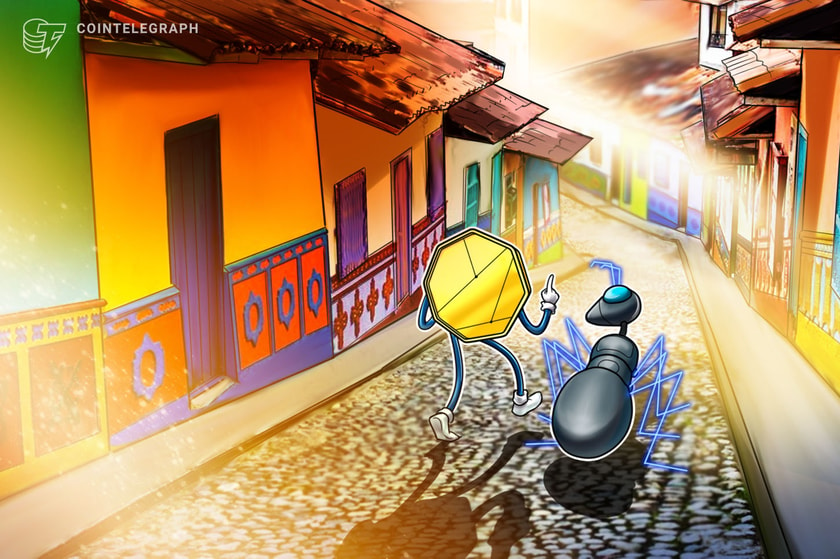
Digital asset exchange Bitfinex has launched a peer-to-peer (P2P) trading platform in Venezuela, Argentina and Colombia.
In a June 27 announcement, the crypto exchange said it had started the “Bitfinex P2P” platform allowing users in the South American nations to buy and sell Bitcoin (BTC), Ether (ETH), Tether (USDT), Tether’s euro-pegged stablecoin EURT and Tether Gold (XAUT). Bitfinex chief technology officer Paolo Ardoino suggested the expansion into the three countries was part of the firm’s efforts to promote digital asset-related financial services in Latin America.
Something BIG is happening! #BitfinexP2P is redefining P2P trading, driving economic growth, and promoting financial inclusivity in LATAM.
Learn more: pic.twitter.com/gw2Y9X4CfP
— Bitfinex (@bitfinex) June 27, 2023
Related: Peer-to-peer crypto exchanges struggle to navigate shifting legal landscape
The launch announcement followed Bitfinex’s El Salvador arm receiving a digital asset service provider license from the country’s National Digital Asset Commission in April. The exchange also partnered with Chile-based crypto platform OrionX in May, aiming to support local education programs and financial literacy.
P2P crypto exchange LocalBitcoins, which provided services to many residents of Latin America, shuttered its operations in February after more than 10 years. Paxful, another platform popular in the region, suspended operations in April but announced in May it was back online.
Magazine: Cryptocurrency trading addiction: What to look out for and how it is treated






